
By Ofira Seliktar and Farhad Rezaei
The Iranian regime views Biden as a weak president who can be safely challenged. Greatly encouraged by the American debacle in Afghanistan, Iran’s new hard-line president Ebrahim Raisi has declared a new Russian-Chinese-Iranian alliance and promised an aggressive policy toward the US.
One result of America’s humiliating defeat in Afghanistan is already clear. The inept and chaotic manner of the American withdrawal cemented Tehran’s view that President Joe Biden is a weakling who can be safely ignored.
This assessment of Biden was in place before he had even assumed office. The Iranian regime much preferred him to his predecessor Donald Trump, whom it greatly feared. In early December 2019, media outlets associated with the Islamic Revolutionary Guard Corps (IRGC), notably the Kayhan newspaper, the Tasnim News Agency, and the Fars News Agency, concluded that Biden was a “wet noodle.” Once Biden took office, the IRGC media made a point of stressing that his administration was full of foreign policy and intelligence officials eager to return to the Joint Comprehensive Plan of Action (JCPOA). Commenting on Robert Malley, Biden’s Iran representative, the IRGC media concluded that “the US government needs the JCPOA more than we do.”
The Guards, which have no intention of rejoining the agreement, have urged the ultra-hardline Majlis—with the support of Supreme Leader Ayatollah Ali Khamenei—to pass a law requiring the Atomic Energy Organization of Iran (AEOI) to ratchet up nuclear development work significantly. The International Atomic Energy Agency (IAEA) noted that Iran has already enriched uranium up to 60% and started metal uranium enrichment up to 20%, both of which are well beyond JCPOA limits.
The regime has tested Biden in other arenas as well. It has conducted naval operations against American allies’ ships, increased Houthi attacks on Saudi and Emirati facilities, and ordered the shelling of American bases in Iraq by pro-Iranian militias. As expected, the Biden administration scarcely responded to any of these provocations.
Iranian goading of the US accelerated after President Ebrahim Raisi took office. Known as the “Butcher of Tehran” for his role in murdering thousands of political prisoners in 1988, Raisi was closely associated with the extremist Ayatollah Muhammad-Taqi Mesbah Yazdi. As a high-ranking judge, Raisi faithfully implemented Mesbah Yazdi’s radical interpretation of sharia law. Like his mentor, he is very close to the IRGC. Raisi’s cabinet is a veritable “A-list of sanctioned persons,” in the words of one commentator. For instance, Ahmed Vahidi, the prospective Minister of the Interior, was sanctioned by the US and the EU and is wanted by Interpol for the 1994 AMIA bombing in Argentina. Raisi himself was sanctioned for the 1988 massacre.
Foreign Minister designate Hossein Amir-Abdollahian is another extreme hardliner. He served as IRGC representative in the foreign ministry of Muhammad Javad Zarif and is very close to Hezbollah leader Hassan Nasrallah. He is also close to Hamas, having served as Secretary General of the Permanent Secretariat of the International Conference in Support of the Palestinian Intifada and as managing director of Palestine Strategic Discourse Quarterly. Published in several languages, the Quarterly suggests ways in which Palestinians can attack Israel.
Whatever little American pushback there might once have been against Raisi’s hard line evaporated after Biden’s debacle in Afghanistan. Amid celebrations in Tehran, Raisi announced that the ignominious American collapse signals the coming of a new international order, with Russia and China forming a credible bloc against the US. President Raisi is hoping to expedite multibillion-dollar agreements with Moscow and Beijing and attain full membership in the all-important Shanghai Cooperation Organization. Raisi has expressed confidence that the new realignment will help Iran evade sanctions and also protect it at the United Nations.
Maj. Gen. Muhammad Reza Ashtiani, Raisi’s nominee for Defense Minister, went so far as to announce a bold new foreign and security policy. He said, “Our country has an important role to play in strengthening the resistance front and expending the radius of security beyond the borders of the country,” implying the advent of a more aggressive use by Tehran of its proxies abroad. He also promised to continue developing the nuclear program and to deliver a “decisive response to sanctions.”
While Ashtiani did not elaborate on what a “decisive response” might be, Hezbollah’s decision to purchase Iranian oil and diesel is a case in point. On August 19, 2021, Hassan Nasrallah disclosed that Lebanese businessmen had paid for the purchase and warned the US and Israel that “from the moment the Iranian ship sails, [Hezbollah] will consider it Lebanese territory.” Lest anyone miss the symbolism, Hezbollah-linked social media posted a photo showing a tanker draped in a huge Iranian flag within an “outline of a bomb…breaking through the word ‘USA’.”
Iranian oil has been secretly smuggled to Lebanon and Syria before, triggering a shadow war with Israel. By having Nasrallah openly disclose these plans, the Iranian regime is challenging Biden to respond. In 2020, President Trump ordered fuel from four Iranian tankers bound for Venezuela confiscated. Evidently, the regime does not expect “the weakling Biden” to do the same.
Published with Permission: BESA Center Perspectives Paper No. 2,136, August 26, 2021






